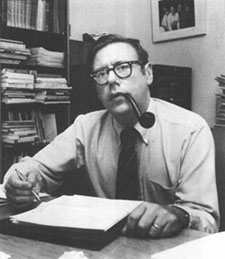Difference between revisions of "Arthur Okun"
(Added: employment, alma_mater, birth_date, birth_place, death_date, death_place, political_parties.) |
m (Text replacement - "He served as " to "He was ") |
||
| (4 intermediate revisions by 2 users not shown) | |||
| Line 2: | Line 2: | ||
|wikipedia=https://en.wikipedia.org/wiki/Arthur_Melvin_Okun | |wikipedia=https://en.wikipedia.org/wiki/Arthur_Melvin_Okun | ||
|amazon= | |amazon= | ||
| − | + | |image=Arthur Melvin Okun.jpg | |
| − | |image= | + | |nationality=US |
| − | |nationality= | + | |birth_date=November 28, 1928 |
| − | |birth_date=1928 | ||
|birth_place=Jersey City, New Jersey, U.S. | |birth_place=Jersey City, New Jersey, U.S. | ||
| − | |death_date=1980 | + | |death_date=March 23, 1980 |
| − | |death_place=Washington | + | |death_place=Washington D.C., U.S. |
| − | |constitutes= | + | |description=Chair of the Council of Economic Advisers 1968-1969 |
| + | |constitutes=economist | ||
|alma_mater=Columbia University | |alma_mater=Columbia University | ||
| − | |political_parties=Democratic | + | |political_parties=Democratic Party (United States) |
|employment={{job | |employment={{job | ||
|title=Chair of the Council of Economic Advisers | |title=Chair of the Council of Economic Advisers | ||
|start=February 15, 1968 | |start=February 15, 1968 | ||
|end=January 20, 1969 | |end=January 20, 1969 | ||
| + | |next=February 4, 1969 | ||
}} | }} | ||
}} | }} | ||
| + | '''Arthur Melvin''' "'''Art'''" '''Okun''' was an American economist. He was the chairman of the [[Council of Economic Advisers]] between 1968 and 1969. Before serving on the C.E.A., he was a professor at [[Yale University]] and, afterwards, was a fellow at the [[Brookings Institution]] in Washington, D.C. | ||
| + | In 1968 he was elected as a [[Fellow of the American Statistical Association]].<ref>[http://www.amstat.org/awards/fellowslist.cfm View/Search Fellows of the ASA], accessed 2016-08-20.</ref> | ||
| + | |||
| + | Okun is known in particular for promulgating [[Okun's law]], an observed relationship that states that for every 1% increase in the [[unemployment rate]], a country's [[Gross Domestic Product|GDP]] will be roughly an additional 2% lower than its [[potential GDP]]. He is also known as the creator of the [[misery index (economics)|misery index]], where it is assumed that both a higher rate of unemployment and a worsening of inflation create economic and social costs for a country.<ref>Okun, Arthur M. (1975), ''Equality and Efficiency: The Big Tradeoff''. Washington, D.C.: Brookings Institution, 1975, pp. 91–92.</ref> He died on March 23, 1980 of a heart attack. <ref> [https://www.washingtonpost.com/archive/local/1980/03/24/arthur-okun-dies-economic-adviser-to-johnson/9157cfb8-6eac-46ac-a8ea-50cc54176aa9 Arthur Okun Dies, Economic Adviser to Johnson], accessed 2020-08-14.</ref> | ||
{{SMWDocs}} | {{SMWDocs}} | ||
==References== | ==References== | ||
{{reflist}} | {{reflist}} | ||
| − | {{ | + | {{PageCredit |
| + | |site=Wikipedia | ||
| + | |date=01.01.2022 | ||
| + | |url=https://en.wikipedia.org/wiki/Arthur_Melvin_Okun | ||
| + | }} | ||
Latest revision as of 14:13, 2 May 2022
(economist) | ||||||||||||
|---|---|---|---|---|---|---|---|---|---|---|---|---|
 | ||||||||||||
| Born | November 28, 1928 Jersey City, New Jersey, U.S. | |||||||||||
| Died | March 23, 1980 (Age 51) Washington D.C., U.S. | |||||||||||
| Nationality | US | |||||||||||
| Alma mater | Columbia University | |||||||||||
| Party | Democratic Party (United States) | |||||||||||
Chair of the Council of Economic Advisers 1968-1969
| ||||||||||||
Arthur Melvin "Art" Okun was an American economist. He was the chairman of the Council of Economic Advisers between 1968 and 1969. Before serving on the C.E.A., he was a professor at Yale University and, afterwards, was a fellow at the Brookings Institution in Washington, D.C. In 1968 he was elected as a Fellow of the American Statistical Association.[1]
Okun is known in particular for promulgating Okun's law, an observed relationship that states that for every 1% increase in the unemployment rate, a country's GDP will be roughly an additional 2% lower than its potential GDP. He is also known as the creator of the misery index, where it is assumed that both a higher rate of unemployment and a worsening of inflation create economic and social costs for a country.[2] He died on March 23, 1980 of a heart attack. [3]
References
- ↑ View/Search Fellows of the ASA, accessed 2016-08-20.
- ↑ Okun, Arthur M. (1975), Equality and Efficiency: The Big Tradeoff. Washington, D.C.: Brookings Institution, 1975, pp. 91–92.
- ↑ Arthur Okun Dies, Economic Adviser to Johnson, accessed 2020-08-14.
Wikipedia is not affiliated with Wikispooks. Original page source here